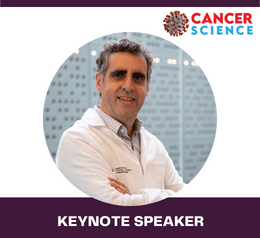Scholars World Congress on
Cancer Research and Oncology
THEME: "Frontiers in Cancer Research and Oncology"
 14-15 Nov 2022
14-15 Nov 2022  TIME Asma Hotel, Albarsha | Dubai, UAE & Online (Hybrid event)
TIME Asma Hotel, Albarsha | Dubai, UAE & Online (Hybrid event) THEME: "Frontiers in Cancer Research and Oncology"
 14-15 Nov 2022
14-15 Nov 2022  TIME Asma Hotel, Albarsha | Dubai, UAE & Online (Hybrid event)
TIME Asma Hotel, Albarsha | Dubai, UAE & Online (Hybrid event) 
Josep Carreras Leukaemia Research Institute, Spain
Title: Cancer Epigenomics and Epitranscriptomics From Knowledge to Applications
Dr Manel Esteller is an M.D., Ph.D from the Universitat de Barcelona. He was a researcher at Johns Hopkins where his work was decisive in establishing promoter hypermethylation of tumor suppressor genes. Dr. Esteller was the Leader of the CNIO Cancer Epigenetics Laboratory and the Director of the Cancer Epigenetics and Biology Program (PEBC) in Barcelona. He is the Director of the Josep Carreras Leukaemia Research Institute (IJC), Chairman of Genetics in the University of Barcelona and ICREA Research Professor. His research is devoted to the establishment of the cancer epigenome. He is a highly cited researcher and has received prestigious recognitions.
For the last twenty-five years an increasing amount of evidence has shown the relevance of epigenetics in cell biology and tissue physiology, being DNA methylation aberrations in cancer the flag-ship for the recognition of its disturbance in human diseases. From the candidate gene approaches, new powerful technologies such as comprehensive DNA methylation microarrays and whole genome bisulfite sequencing has recently emerged that have reinforced the notion of epigenetic disruption in the crossroad of many sickness. From the poster-boy cases of MGMT and GSTP1 hypermethylation in the prediction of alkylating drug response and prostate cancer detection, respectively, to the personalized treatment of leukemia with small molecules targeted to fusion proteins involving histone modifiers, the field has walked a long path. The current talk will focus in the epigenetic profiling, basically at the level of DNA methylation and histone modifications, that is starting to provide clinical value in the diagnosis, prognosis and prediction of response to drug therapies. For cancer, we have already a wide view of the undergoing DNA methylation events that expand beyond classical promoter CpG islands of tumor suppressor genes and we have a growing list of mutated chromatin remodeler genes that contributes to the tumorigenesis process. It is time to apply this knowledge in practical clinical situations like the diagnosis of cancers of unknown primary, the screening of malignancies in high-risk populations or a biomarker selection of the patients that should receive treatment with anticancer drugs. Beyond our comfort zone, we should be aware that chemical modifications not only affect the DNA molecule, but also RNA. The epigenetics of RNA or the analysis of the epitranscriptome represents another relevant step to understand the complex relationship between genotypes and phenotypes in human tumors.